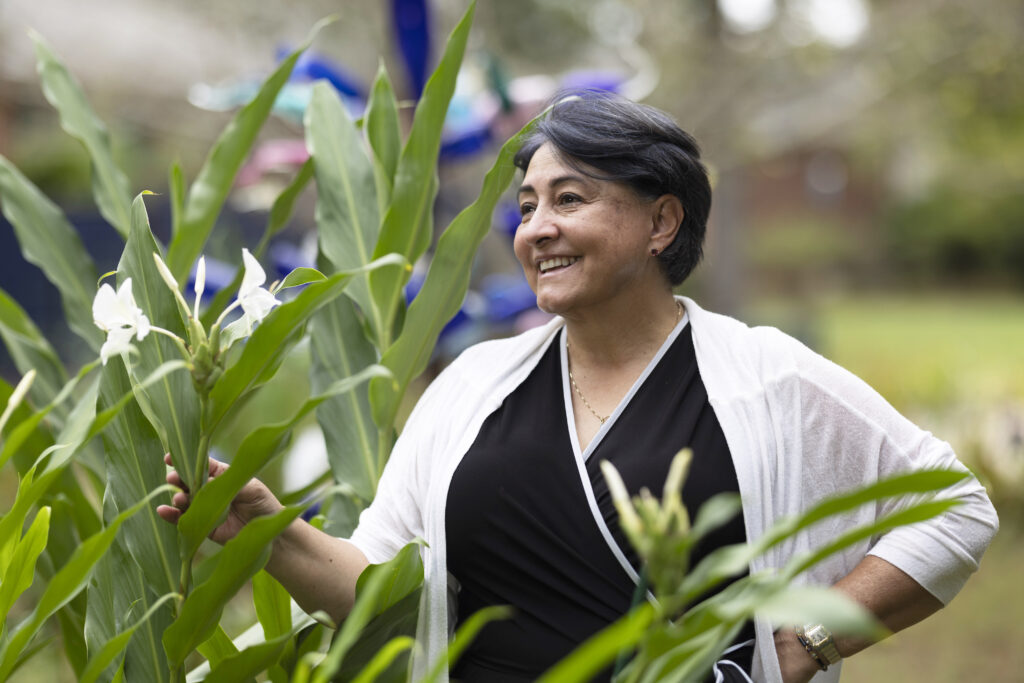Maria Camila Pardo MS ’91 knew from a young age that she wanted to help animals. But even growing up with a father who was a veterinarian, she could not have predicted the far-reaching impact of her work.
Pet owners are likely familiar with Pardo’s work. With her team, she developed a vaccine for intestinal disease in dogs and a canine distemper vaccine, which protects against an extremely contagious and potentially deadly virus. She was also involved in the development of a transdermal feline leukemia vaccine, which guards against one of the most common infectious diseases in cats.
These vaccines are part of many animals’ regular vaccine schedules, but they help more than just household pets.
Pardo’s vaccines and the research behind them also safeguards wild, captive animals. During her time at the biological and pharmaceutical company Merial, now Boehringer Ingelheim Animal Health, she was an important part of the team developing and bringing vaccines to market. This included the commercial distemper vaccine, which is used by veterinarians for pets such as ferrets and dogs and is also used off-label safely in other species.
“Even as a veterinarian, I didn’t know that so many animals could be infected through the distemper virus,” Pardo says. “But it’s so common that in the nomenclature, it’s no longer known as the canine distemper—it’s called carnivore distemper or canine morbillivirus. It kills many wild animals such as red and giant pandas, African lions, black-footed ferrets, and more.”
When there was a distemper outbreak in giant pandas in China in the late 1990s, the Smithsonian National Zoo’s chief pathologist Dr. Richard Montali reached out to Pardo about an upcoming recombinant distemper vaccine for dogs. Pardo was able to develop an experimental batch of the vaccines which were used to protect giant pandas in zoos across the country.
Giant pandas are among the species that are susceptible to smaller viral loads of the disease, and they are better protected with a recombinant vaccine—one that uses a smaller part of the virus while still providing a strong immune response.
The project was a highlight of her career, Pardo says, and she is proud to know that her work has positively impacted the lives of countless animals and humans. But it might not have been possible without the University of Georgia.
Pardo studied veterinary medicine in Colombia before coming to UGA for a postdoctorate in veterinary microbiology and immunobiology at the Poultry Diagnostic and Research Center in the College of Veterinary Medicine, under Dr. Pedro Villegas. The resources at UGA not only connected her with future jobs but also helped make Athens home.
When there was a distemper outbreak in giant pandas in China in the late 1990s, the Smithsonian National Zoo’s chief pathologist Dr. Richard Montali reached out to Camila Pardo MS ’91 about an upcoming recombinant distemper vaccine for dogs. Pardo was able to develop an experimental batch of the vaccines which were used to protect giant pandas in zoos across the country.
“UGA is one of the best veterinary research schools,” Pardo says. “This is a famous spot to study avian and mammal infectious diseases because of our research centers, the world-class veterinary school, and UGA’s microbiologists and pathologists. I originally came here for just two years, but now, I’ve spent most of my life here in Athens.”
Pardo retired from her vaccine development role in 2012, but she remains involved in the process as a consultant. She frequently speaks at conferences, highlighting the importance of vaccines and helping veterinarians communicate that importance to their communities.
This work will only get more important, Pardo says, as development in previously wild areas and rising temperatures give some viruses a wider reach and affect more animals.
“As humans, we are a growing population and keep building neighborhoods and cities where it was wildlife and wilderness before,” Pardo says. “So we’re bringing ourselves and our pets into these areas that were wild, where they can encounter potentially diseased wildlife. We cannot lower our defenses.”
